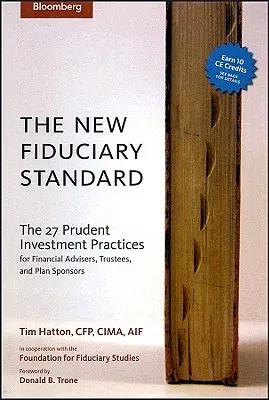Financial advisers, trustees, and plan sponsors--in fact, anyone who
provides investment advice--may be held to a fiduciary standard of
care for the financial well-being of their clients, beneficiaries, or
employees.
Accountants, attorneys, and wealth managers all need to know about these
responsibilities. But what, exactly, is meant by the term fiduciary
standard? What must advisers do to be sure their procedures meet legal
and ethical standards?
This book identifies the 27 Prudent Practices, organized under the Five
Steps, that were developed by the Foundation for Fiduciary
Studies--measures that professionals can take to demonstrate that they
accept, understand, and are fulfilling the role of a fiduciary.
- Financial advisers and others offering investment advice will add
meaningful value to their practice and show tangible evidence of what
sets them apart from the pack.
- Attorneys, CPAs, and others serving as trustees will possess the
knowledge to determine whether or not their clients' investment
portfolios are being managed appropriately.
- Plan sponsors will know what to look for in selecting investment
consultants and in giving employees the disclosures and information
they need.
The most far-reaching trend in the financial-advisory business today is
the move toward a fiduciary standard of care. This book establishes for
the industry a credible investment-decision process that will meet the
growing expectations of investors and regulators for integrity,
transparency, and disclosure of fees and conflicts that affect their
returns.

